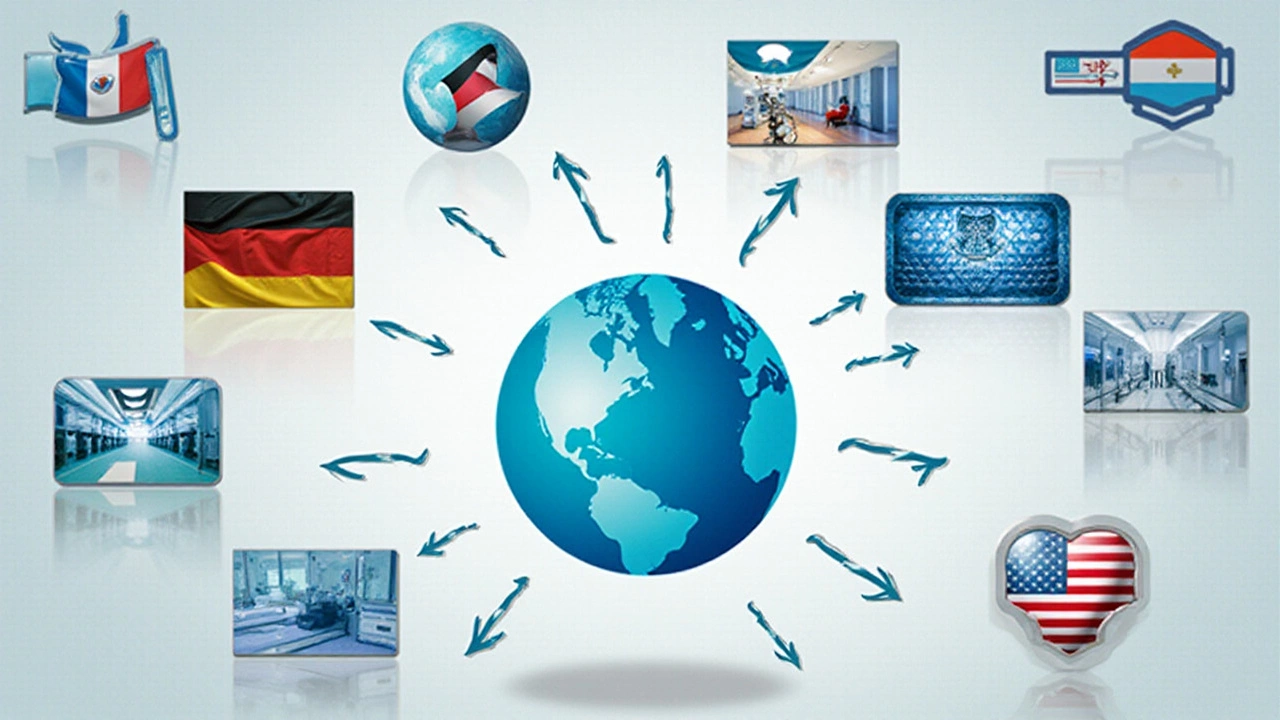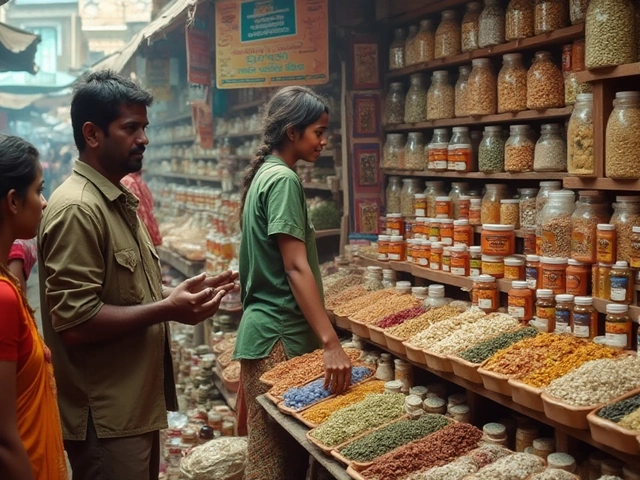- Home
- ::
- Top Countries for World-Class Medical Treatment and Tourism

Top Countries for World-Class Medical Treatment and Tourism
As the world becomes more interconnected, medical tourism continues to boom, drawing millions of patients across borders in search of quality healthcare services. Many countries have emerged as leaders in providing advanced medical treatments combined with the benefits of travel experiences.
Patients seeking top-tier medical care are often drawn to nations that offer an enticing balance of affordability and quality. For instance, India and Thailand have become prominent players by offering competitive prices for complex surgeries without compromising the standard of care. Meanwhile, countries like Germany and the United States are renowned for their cutting-edge technology and pioneering research in medical fields.
Choosing the right healthcare destination depends on several factors. From understanding cultural differences to considering language barriers, patients must navigate various elements that influence their medical journey, ensuring a successful and satisfying experience.
- Rising Trend of Medical Tourism
- Affordable Healthcare with Top-notch Quality
- Pioneering Technology and Innovation
- Cultural and Language Considerations
- Tips for Planning Medical Travel
Rising Trend of Medical Tourism
The concept of medical tourism has been gaining momentum globally, and it's nothing short of a phenomenon. People are crossing borders, not just to see the world, but to improve their health through access to some of the best medical treatments available. The allure lies in not only seeking affordable healthcare but also in experiencing a different culture. The world has become a smaller place, and accessing treatment in another country is no longer the daunting task it once was. Many individuals have found solace in the fact that they can receive top-notch medical care without breaking the bank.
The cost of healthcare continues to be a driving factor. For instance, the United States is known for its high healthcare costs, often prompting patients to seek alternatives abroad. Countries like India and Thailand have capitalized on this, offering equally high-quality services at a fraction of the cost. In these places, patients have the chance to recuperate in a serene environment, while also enjoying the benefits of tourism. The quality of hospitals and medical professionals in these countries is often comparable to those in the West, which surprises many first-time medical tourists.
In fact, the market value of medical tourism reached an impressive $87.5 billion in 2020 and is projected to grow at about 21.1% annually from 2021 to 2027. This boom can be attributed not only to cost savings but also to the accessibility of advanced treatments. Innovations in medical technology and the presence of reputed doctors further entice patients longing for specialized care. Take, for example, the development of world-class facilities that cater to international patients by offering tailored packages, including language interpreters and post-surgery tourism plans.
According to a leading report published by the Medical Tourism Association, "The growth trajectory of medical tourism reflects not just the economic aspect but also an evolution in the perception of global healthcare." This evolution signifies increasing trust in foreign healthcare services, breaking down preconceived notions, and emphasizing the importance of choice in medical treatment location.
The change in perception extends beyond economics. Many are drawn to the expediency of treatment options. Lengthy waiting times in countries with publicly funded health systems, such as the UK and Canada, have led patients to seek faster care abroad. Speed, combined with expertise, positions nations like Singapore and South Korea at the forefront of medical tourism. Patients who seek immediate care can get treatments without the delay, ensuring their health takes priority.
Lastly, governments in these countries have recognized the potential of medical tourism as an economic boost, leading to supportive policies and the development of medical cities. For example, Malaysia promotes itself as an ideal medical tourism hub by providing international standards at affordable prices. Medical tourism is more than just a healthcare choice; it's becoming an indispensable part of the global healthcare landscape, fueled by a thirst for quality, affordability, and cultural exploration.
Affordable Healthcare with Top-notch Quality
In recent years, the pursuit of accessible healthcare without sacrificing quality has become a reality for many through the growing industry of medical tourism. Countries like India and Thailand have positioned themselves as frontrunners in this field by providing exceptional healthcare services at prices that are a fraction of what one might expect to pay in Western nations. This remarkable price difference does not mean a compromise on quality. In fact, certain procedures that might cost upwards of $100,000 in the United States could be available for less than $15,000 in these Asian countries, with equivalently skilled surgeons and world-class facilities.
Indian hospitals, for example, have earned a reputation for complex surgeries, including heart bypass procedures and orthopedic treatments. The Indian healthcare system benefits from a vast pool of highly trained medical professionals, many of whom have received education and training in prestigious institutions globally. According to a
report by the Medical Tourism Association, India's healthcare system is ranked among the top three in Asia for affordable and quality treatment.These facilities often come equipped with state-of-the-art technology and are accredited by international standards, ensuring that patients receive care that is on par with, or even exceeds, that available in their home countries.
Thailand has crafted its niche in the medical tourism landscape by excelling in procedures like cosmetic surgery and dental care. Advanced infrastructure and competitive pricing attract international tourists seeking to combine their medical procedures with holiday excursions. The Thai medical staff's proficiency in English makes the experience less daunting for foreigners, opening doors to seamless communication and understanding. Moreover, the country's healthcare regulatory oversight ensures that hospitals and clinics maintain rigorous standards of hygiene and patient care, providing additional assurance to international patients.
Several factors deter patients from seeking medical care abroad, often dominated by concerns around safety and quality. However, with global healthcare becoming increasingly democratized, countries across the world have made significant strides in bridging the gap between affordability and excellent care. Countries such as Mexico and Turkey also contribute to the affordable healthcare spectrum, offering competitive prices for dental and aesthetic treatments. A comparison of healthcare costs reveals that these countries offer savings of 40-80% compared to the United States and Western Europe, prompting many individuals to reconsider where they receive their treatment.
Below is a table comparing cost savings for common procedures in select medical tourism destinations:
| Procedure | USA Cost (USD) | India Cost (USD) | Thailand Cost (USD) |
|---|---|---|---|
| Heart Bypass | 130,000 | 11,000 | 15,000 |
| Hip Replacement | 40,000 | 6,500 | 10,000 |
| Breast Augmentation | 9,000 | 2,000 | 3,500 |
The allure of affordable yet high-quality healthcare in these emerging medical tourism destinations is undeniable. With an emphasis on excellence, these countries are proving that it is possible to receive top-tier medical treatment without breaking the bank. As medical tourism continues to evolve, millions worldwide are starting to recognize and embrace this opportunity, changing the landscape of global healthcare.

Pioneering Technology and Innovation
In a rapidly evolving world, the landscape of medical tourism is predominantly shaped by countries that invest heavily in pioneering technology and innovation. Often serving as the vanguard of healthcare advancement, places like the United States, Germany, and Japan have consistently pushed the boundaries of what is possible in medical science. Offering everything from breakthrough cancer treatments to cutting-edge cardiac surgeries, these countries attract patients globally who seek quality healthcare experiences that utilize state-of-the-art technologies. The benefits of such technological prowess are not merely in the sophisticated treatments but also in the precision and efficiency they enable, which directly impacts patient outcomes.
Among the nations leading this charge, the United States stands out with its investment in biotechnology and medical research. Renowned medical institutions like the Mayo Clinic and Johns Hopkins Hospital have set global standards with their adoption of robotic surgeries and personalized medicine approaches. Their emphasis on precision medicine -- where treatment is tailored to individual genetic profiles -- marks a significant shift from traditional practices, promising more effective and targeted therapy. As Dr. Lisa Sanders, a Yale University School of Medicine clinician, noted in a recent panel discussion, “We’ve moved from a standardized healthcare model to one that recognizes the uniqueness of every patient.”
The rapid advancements we've seen in medical technology are not just about improving existing treatments; they're about redefining them for better efficacy and safety.
Equally, Germany’s healthcare system is a beacon of innovation, particularly in the realm of medical devices and pharmaceuticals. The country’s ability to offer patients cutting-edge technology in hospitals, often coupled with shorter wait times and highly skilled personnel, makes it a favorite among medical tourists. Institutions here have embraced the Internet of Medical Things (IoMT), integrating healthcare systems with digital diagnostics that are crucial for efficient patient care. This interconnectedness allows for continuous monitoring and a level of proactive health management that was unthinkable a decade ago, vastly improving the quality of care patients receive. A testament to this is Germany's development of leading-edge imaging technologies, permitting earlier and more accurate diagnoses for various conditions.
Japan, with its technological acumen, is equally noteworthy in its interventions in healthcare innovation. The country has made significant strides in leveraging AI to transform patient care, from robotic exoskeletons used in rehabilitation to AI-driven diagnostics that support healthcare professionals in making swift, informed decisions. These advancements not only enhance patient experiences but also deal with a critical challenge: the shortage of healthcare workers. By employing robots and automated systems, Japan adds efficiency, allowing medical staff to spend more time with patients and less on administrative duties. This balance between technology and human care is increasingly essential as healthcare demands soar globally. As Haruki Yokoyama, a robotics expert, once said,
"The future of medicine is in harmony, where human expertise is augmented by technology to create superior outcomes."
Amidst all these developments, it is crucial for those considering healthcare quality abroad to acknowledge that the journey is not only about the technology a country can offer but also how it integrates such advancements into everyday medical practice. That holistic incorporation—the seamless weaving of innovation into regular patient care—significantly dictates the potency and real-world applicability of medical treatments. In choosing their medical destinations, patients must consider countries that not only boast technological prowess but demonstrate an entrenched culture of continual learning and adaptation in their healthcare practices. This approach ensures consistent and unparalleled medical care which is fundamentally necessary to achieving great health outcomes.
Cultural and Language Considerations
Traveling for medical treatment can be daunting, especially when it involves crossing into unfamiliar cultural territories. Understanding cultural dynamics is crucial when embarking on a medical tourism journey. Each country has its own set of social norms, traditions, and practices that play a vital role in patient interactions and healthcare delivery. For example, in Thailand, the traditional wai greeting conveys respect and politeness, which can help patients build rapport with healthcare providers. Such gestures can significantly enhance the patient experience by fostering mutual respect and understanding.
Language is another key consideration for those seeking global treatment. Not speaking the local language might create barriers in communication, leading to misunderstandings. Fortunately, many top medical tourism destinations offer multilingual staff or professional translation services to assist international patients. In India, English is widely spoken among healthcare professionals, making it easier for English-speaking patients to navigate their treatment. However, opting for a country with accessible language services can greatly alleviate the stress of medical travel.
While language and culture are critical aspects, religious considerations should also not be overlooked. In predominantly Muslim countries like Turkey, understanding religious practices can help patients plan their treatment around important events. An awareness of dietary requirements can also be essential, ensuring patient comfort and compliance with pre- or post-operative protocols. Hospitals often extend their services to include dietary accommodations to fulfill cultural and religious needs, which ultimately add to the patient's holistic well-being during their stay.
"Health and medical travel experiences are improved significantly when cultural sensitivity is prioritized, leading to better patient satisfaction," states a study by the International Journal of Healthcare Management.
For a seamless experience, it's advisable to research and reach out to hospitals in advance about cultural comforts they offer. Building awareness will not only enhance the overall quality of the journey but may also prevent any potential misunderstandings. Conducting thorough research helps navigate these cultural waters effectively, ensuring both peace of mind and a better prognosis.
To assist in making an informed choice, one might also consider consulting with former patients who have undergone similar procedures. There are numerous medical tourism forums and patient testimonials available online where visitors share their experiences. These insights can provide valuable perspectives on cultural and language factors, making it easier to choose the right healthcare destination. Keeping a checklist of cultural and language requirements can also serve as a beneficial planning tool, ensuring that these crucial elements are not overlooked when selecting a country for medical treatment.

Tips for Planning Medical Travel
Embarking on a journey for medical tourism requires careful planning to ensure a seamless and worry-free experience. It's crucial to start with medical tourism research. Identifying the right destination depends on the specific treatment you need and the expertise available in various countries. Look for accredited hospitals and experienced specialists. Many nations have institutions recognized by international accrediting bodies, which can assure you of their standards and quality. Besides, check online forums and reviews from previous patients to get an unbiased perspective on what to expect from the hospital and the locality.
Finance is the next significant factor when considering global treatment. While it's tempting to base your decision solely on low prices, the cheapest option doesn't always mean quality. Compare costs for treatments in different countries and see what fits within your budget. Don't forget to factor in additional expenses like travel, accommodation, and post-treatment care. Some hospitals offer comprehensive packages that cover everything from surgery to sightseeing. It's wise to have insurance that covers medical travel, ensuring you are protected against unforeseen circumstances. According to a survey, nearly 80% of medical tourists pay less than half of the cost they would incur in their home country.
Cultural and language considerations play a pivotal role in your overall experience. Familiarize yourself with the local customs of your chosen destination which can help ease any discomfort or misunderstanding. Many healthcare providers in high-ranking medical tourism countries offer translation services, but knowing a few key phrases in the native language might enhance your experience. Consider dietary differences too, as they might impact your recovery, especially if specific post-operative diets are recommended. Remember, the goal is to not only recover physically but also have a positive experience culturally.
Preparation is key, so make sure you have all your medical records ready and translated if necessary. This will help the doctors abroad understand your medical history and tailor the treatment accordingly. Schedule follow-up appointments and get a clear post-op care plan before leaving for home. Communication with your healthcare provider shouldn't cease after your procedure. Establish ways to stay in touch with your doctors abroad for follow-ups, which could be critical for long-term recovery. Remember, the success of your procedure isn't just in the hands of your doctors; it's also about how you manage your pre and post-operative care.
The Medical Tourism Association states, "An informed patient is an empowered patient, and with the right resources, outcomes improve dramatically."
Finally, document your travel, treatment experiences, and any insights you gain. Sharing this information can aid future patients looking into healthcare quality abroad. It may also serve as a valuable reference for your follow-up visits. Keep a list of emergency contacts both local and abroad and make sure someone at home is informed of your whereabouts and situation. Having a travel companion is recommended; they can offer support and assist with logistics when needed. With careful planning and attention to these details, you can transform what might seem a daunting task into a journey filled with hope and healing.

 Health and Wellness
Health and Wellness





Write a comment